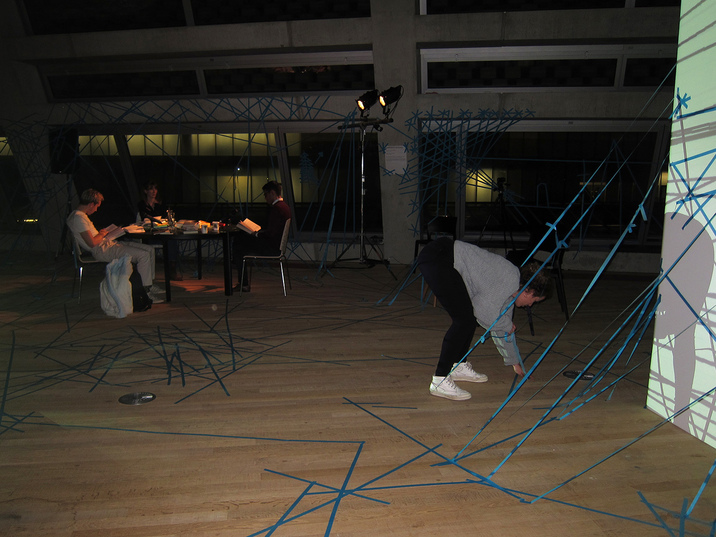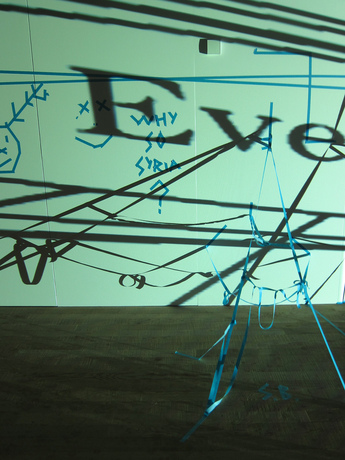
R
E
V N
E
X
T
Viewers were invited to participate in Anybody, Everybody, Make a Mark (2016), one of three actions planned inside the Tate Exchange space in London by RAQS MEDIA COLLECTIVE. All photos by Cleo Roberts.
A dense web of papery blue tape overtook Tate Exchange from December 14 to 18, 2016, under the watch of the Raqs Media Collective. Across the fifth floor of the Switch House building, this mass of translucent blue lines spanned across the walls and stretched along the floor as a result of their latest participatory installation, “Thicket.” Shaped by three actions—Anybody, Everybody, Make a Mark, Unbroken Reading and Memorophilia—the piece incrementally transformed the Exchange into a multi-sensory exploration of thought, time and memory over the course of five days.
Entering during Unbroken Reading on Friday, December 16, a faint voice reciting a text filled the space and drew visitors through the blue marks to a circular table set with piles of books. These were publications plucked from the collective’s New Delhi studio, including Italo Calvino’s postmodernist tale If on a Winter’s Night a Traveller (1979), Liu Cixin’s Hugo Award-winning The Three-Body Problem (2006) and Michel de Montaigne’s The Complete Essays (1580), each housing a sheer blue plastic bookmark within its leaves. A reader sat poised before a microphone, performing a chosen text and animating the written words with idiosyncratic pauses and intonation. Another person sat opposite the reader, waiting her turn, strumming the pages of a collection of Kabir’s Ecstatic Poems (1977), eager to take over and share the Indian mystic’s influential words with the room. This established a direct conceptual connection between “Thicket”’s participants and the Raqs Media Collective, as the artists often read aloud to each other in their New Delhi studio. Readers—all volunteers from the consistent flow of visitors—were focused, sincere and became integrated with their texts. As Shuddhabrata Sengupta and Jeebesh Bagchi—two members of the three-piece collective—told me, participants had read with great generosity, some spending up to an hour speaking into the microphone, inscribing themselves into the space with their voices.
This willingness to become part of “Thicket” was, from Sengupta’s perspective, contingent on the blue tape, the initial form of which was created on the opening day. Raqs Media Collective’s first planned action, Anybody, Everybody, Make a Mark, was an invitation to treat the Exchange, a white-walled project space, as a drawing room; the images and shapes made using rolls of blue tape had created what Sengupta described as a “nested feeling” and a “cradle” for the performance. The nurturing environment was emphasized by bright light from the film work Diagram of the Last International (2016), an excavation from Raqs members’ personal computers of a series of words—including “anybody,” “antibody ” and “everybody.” As the film played, contour lines moved across the room creating shadows and exaggerating the cocoon-esque feeling.
Some participants used the blue tape to write a range of intimate political messages and questions—such as “Why so Syria?”—along with extracts of Urdu love poetry and statements about peace. The space was hospitable and felt weighted with the exchange of ideas. Reading these expressions while ambulating the space with Bagchi, it was clear that the cumulative effect of the tape, film and spoken performance provided a timely forum for expression. Whilst reflecting on the transnational climate of anxiety following the year’s rise in populist rhetoric, he ventured, “Conversations have shifted.” As Bagchi spoke, the room had literally become a venue where anyone could project their own voices and listen to others. Sengupta later told me that “Thicket” was designed to be a space where “people of all ages can let themselves go.”
Blue tapes are mounted on the ceiling, floor, wall and interwoven with each other. The film projection onto these architectural forms create light and shadows.
Sitting with the artists on a sofa in the corner of the Tate Exchange’s entrance, we watched the participants’ reactions. The collective’s ambition was achieved. People climbed through the web of blue tape, added to the mass of material, sat on the floor playing games, and formed Unbroken Reading. The audience were uninhibited and “Thicket” elicited diverse thoughts and articulations. Given the incredible participation found in the visitors’ responses, Raqs’ scheme to redefine space is certain to find future iterations. With all readings recorded on video, and a bibliography of the texts in progress, the possibilities, as ever with Raqs, are intriguing.
Visit the Tate Exchange website for more details on upcoming workshops and events.
To read more of ArtAsiaPacific’s articles, visit our Digital Library.






